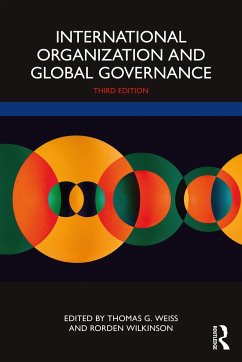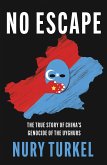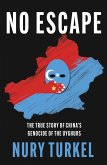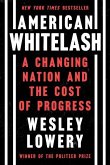International Organization and Global Governance
Herausgeber: Weiss, Thomas G.; Wilkinson, Rorden
International Organization and Global Governance
Herausgeber: Weiss, Thomas G.; Wilkinson, Rorden
- Broschiertes Buch
- Merkliste
- Auf die Merkliste
- Bewerten Bewerten
- Teilen
- Produkt teilen
- Produkterinnerung
- Produkterinnerung
Concise chapters from a diverse mix of established and emerging global scholars offer accessible, in-depth coverage of the history and theories of international organization and global governance and discussions of the full range of state, intergovernmental, and non-state actors.
Andere Kunden interessierten sich auch für
![The Routledge International Handbook of Children's Rights and Disability The Routledge International Handbook of Children's Rights and Disability]() The Routledge International Handbook of Children's Rights and Disability251,99 €
The Routledge International Handbook of Children's Rights and Disability251,99 €![No Escape No Escape]() Nury TurkelNo Escape22,99 €
Nury TurkelNo Escape22,99 €![No Escape No Escape]() Nury TurkelNo Escape27,99 €
Nury TurkelNo Escape27,99 €![Be a Revolution Be a Revolution]() Ijeoma OluoBe a Revolution15,99 €
Ijeoma OluoBe a Revolution15,99 €![British Politics British Politics]() Bill Jones (UK Liverpool Hope University)British Politics32,99 €
Bill Jones (UK Liverpool Hope University)British Politics32,99 €![American Whitelash American Whitelash]() Wesley LoweryAmerican Whitelash38,99 €
Wesley LoweryAmerican Whitelash38,99 €![American Whitelash American Whitelash]() Wesley LoweryAmerican Whitelash9,99 €
Wesley LoweryAmerican Whitelash9,99 €-
-
-
Concise chapters from a diverse mix of established and emerging global scholars offer accessible, in-depth coverage of the history and theories of international organization and global governance and discussions of the full range of state, intergovernmental, and non-state actors.
Produktdetails
- Produktdetails
- Verlag: Taylor & Francis Ltd
- 3 ed
- Seitenzahl: 812
- Erscheinungstermin: 28. April 2023
- Englisch
- Abmessung: 243mm x 188mm x 39mm
- Gewicht: 1750g
- ISBN-13: 9781032210124
- ISBN-10: 1032210125
- Artikelnr.: 67259977
- Herstellerkennzeichnung
- Libri GmbH
- Europaallee 1
- 36244 Bad Hersfeld
- gpsr@libri.de
- Verlag: Taylor & Francis Ltd
- 3 ed
- Seitenzahl: 812
- Erscheinungstermin: 28. April 2023
- Englisch
- Abmessung: 243mm x 188mm x 39mm
- Gewicht: 1750g
- ISBN-13: 9781032210124
- ISBN-10: 1032210125
- Artikelnr.: 67259977
- Herstellerkennzeichnung
- Libri GmbH
- Europaallee 1
- 36244 Bad Hersfeld
- gpsr@libri.de
Thomas G. Weiss is Presidential Professor of Political Science at The CUNY Graduate Center, New York; he is also Distinguished Fellow, Global Governance, at the Chicago Council on Global Affairs and Eminent Scholar at Kyung Hee University, Korea. Rorden Wilkinson is Professor of International Political Economy and Deputy Vice-Chancellor, Academic, at Macquarie University, Sydney, Australia.
Part I: Introduction From International Organization to Global Governance
Thomas G. Weiss and Rorden Wilkinson Part II: Contextualizing
International Organization and Global Governance Section Introduction 1.
The Emergence of Global Governance Craig N. Murphy 2. The Evolution of
International Law Charlotte Ku 3. International Organizations and the
Diffusion of Power Michael Barnett and Raymond Duvall 4. The Diffusion of
Authority David Held and Eva-Maria Nag 5. Who Governs the Globe? Susan K.
Sell Part III: Theories of International Organization and Global
Governance Section Introduction 6. Realism Jason Charrette and Jennifer
Sterling-Folker 7. Classical Liberal Internationalism* Christer Jönsson
8. Liberal Institutionalism Tana Johnson and Andrew Heiss 9.Constructivism
Susan Park 10. The English School Ian Hall and Tim Dunne 11. Rational
Choice and Indirect Global Governance Henning Tamm and Duncan Snidal 12.
Critical Theory Robert W. Cox 13. Marxism Julian Germann 14. Feminism
Susanne Zwingel, Elisabeth Prügl, and Gülay Caglar 15. Post-Structuralism
James Brassett 16. Post-colonial Global Governance Adekeye Adebajo 17.
Chinese Approaches Yongjin Zhang 18. Queer International Organization and
Global Governance Ariel Mekler Part IV: States and International
Institutions in Global Governance Section Introduction 19. The UN System
Natalie Samarasinghe and Giovanna Kuele 20. The UN General Assembly M. J.
Peterson 21. The European Union Ben Rosamond 22.The Staying Power of the
BRICS Andrew F. Cooper and Ramesh Thakur 23. The Global South Jacquie
Braveboy-Wagner 24. US Hegemony W. Andy Knight 25. China and Global
Governance Shaun Breslin and Ren Xiao Part V: Non-State Actors in Global
Governance Section Introduction 26. Global Corporations Christopher May
27. Civil Society and NGOs Jan Aart Scholte 28. Labor Robert O'Brien 29.
Credit Rating Agencies Timothy J. Sinclair 30. Think Tanks and Global
Policy Networks James G. McGann with Laura Messner 31. Global Philanthropy
Michael Moran 32. Private Military and Security Companies Peter J.
Hoffman 33. Transnational Criminal Networks Frank G. Madsen Part VI:
Securing the World, Governing Humanity Section Introduction 34. UN
Security Council and Peace Operations Paul D. Williams and Alex J. Bellamy
35. Regional Organizations and Global Security Governance S. Neil
MacFarlane 36. Weapons of Mass Destruction Waheguru Pal Singh Sidhu 37.
Countering Terrorism and Preventing Violent Extremism Peter Romaniuk 38.
Human Rights Daniel Braaten and David P. Forsythe 39. The Pursuit of
International Justice Richard J. Goldstone 40. Humanitarian Intervention
and R2P Simon Chesterman 41. Crisis and Humanitarian Containment Fabrice
Weissman 42. Sustaining the Peace Gert Rosenthal 43. Human Security as a
Global Public Good Stefanie Neumeier and Mark Raymond Part VII: Governing
the Economic and Social World Section Introduction 44. Global Financial
Governance Bessma Momani 45. Global Trade Governance Bernard Hoekman 46.
Global Development Governance Katherine Marshall 47. Global Environmental
Governance Elizabeth R. DeSombre and Andrea Sabau 48. Regional Development
Banks and Global Governance Jonathan R. Strand 49. Climate Change Matthew
J. Hoffmann 50.Sustainable Development Goals and the Promise of a
Transformative Agenda Sakiko Fukada-Parr 51. Global Energy Governance
Harald Heubaum 52. Food and Hunger Jennifer Clapp 53. Global Health
Governance Sophie Harman and Andreas Papamichail 54. Refugees and Migrants
Nicholas R. Micinski 56.Global Internet Governance Madeline Carr
Thomas G. Weiss and Rorden Wilkinson Part II: Contextualizing
International Organization and Global Governance Section Introduction 1.
The Emergence of Global Governance Craig N. Murphy 2. The Evolution of
International Law Charlotte Ku 3. International Organizations and the
Diffusion of Power Michael Barnett and Raymond Duvall 4. The Diffusion of
Authority David Held and Eva-Maria Nag 5. Who Governs the Globe? Susan K.
Sell Part III: Theories of International Organization and Global
Governance Section Introduction 6. Realism Jason Charrette and Jennifer
Sterling-Folker 7. Classical Liberal Internationalism* Christer Jönsson
8. Liberal Institutionalism Tana Johnson and Andrew Heiss 9.Constructivism
Susan Park 10. The English School Ian Hall and Tim Dunne 11. Rational
Choice and Indirect Global Governance Henning Tamm and Duncan Snidal 12.
Critical Theory Robert W. Cox 13. Marxism Julian Germann 14. Feminism
Susanne Zwingel, Elisabeth Prügl, and Gülay Caglar 15. Post-Structuralism
James Brassett 16. Post-colonial Global Governance Adekeye Adebajo 17.
Chinese Approaches Yongjin Zhang 18. Queer International Organization and
Global Governance Ariel Mekler Part IV: States and International
Institutions in Global Governance Section Introduction 19. The UN System
Natalie Samarasinghe and Giovanna Kuele 20. The UN General Assembly M. J.
Peterson 21. The European Union Ben Rosamond 22.The Staying Power of the
BRICS Andrew F. Cooper and Ramesh Thakur 23. The Global South Jacquie
Braveboy-Wagner 24. US Hegemony W. Andy Knight 25. China and Global
Governance Shaun Breslin and Ren Xiao Part V: Non-State Actors in Global
Governance Section Introduction 26. Global Corporations Christopher May
27. Civil Society and NGOs Jan Aart Scholte 28. Labor Robert O'Brien 29.
Credit Rating Agencies Timothy J. Sinclair 30. Think Tanks and Global
Policy Networks James G. McGann with Laura Messner 31. Global Philanthropy
Michael Moran 32. Private Military and Security Companies Peter J.
Hoffman 33. Transnational Criminal Networks Frank G. Madsen Part VI:
Securing the World, Governing Humanity Section Introduction 34. UN
Security Council and Peace Operations Paul D. Williams and Alex J. Bellamy
35. Regional Organizations and Global Security Governance S. Neil
MacFarlane 36. Weapons of Mass Destruction Waheguru Pal Singh Sidhu 37.
Countering Terrorism and Preventing Violent Extremism Peter Romaniuk 38.
Human Rights Daniel Braaten and David P. Forsythe 39. The Pursuit of
International Justice Richard J. Goldstone 40. Humanitarian Intervention
and R2P Simon Chesterman 41. Crisis and Humanitarian Containment Fabrice
Weissman 42. Sustaining the Peace Gert Rosenthal 43. Human Security as a
Global Public Good Stefanie Neumeier and Mark Raymond Part VII: Governing
the Economic and Social World Section Introduction 44. Global Financial
Governance Bessma Momani 45. Global Trade Governance Bernard Hoekman 46.
Global Development Governance Katherine Marshall 47. Global Environmental
Governance Elizabeth R. DeSombre and Andrea Sabau 48. Regional Development
Banks and Global Governance Jonathan R. Strand 49. Climate Change Matthew
J. Hoffmann 50.Sustainable Development Goals and the Promise of a
Transformative Agenda Sakiko Fukada-Parr 51. Global Energy Governance
Harald Heubaum 52. Food and Hunger Jennifer Clapp 53. Global Health
Governance Sophie Harman and Andreas Papamichail 54. Refugees and Migrants
Nicholas R. Micinski 56.Global Internet Governance Madeline Carr
Part I: Introduction From International Organization to Global Governance
Thomas G. Weiss and Rorden Wilkinson Part II: Contextualizing
International Organization and Global Governance Section Introduction 1.
The Emergence of Global Governance Craig N. Murphy 2. The Evolution of
International Law Charlotte Ku 3. International Organizations and the
Diffusion of Power Michael Barnett and Raymond Duvall 4. The Diffusion of
Authority David Held and Eva-Maria Nag 5. Who Governs the Globe? Susan K.
Sell Part III: Theories of International Organization and Global
Governance Section Introduction 6. Realism Jason Charrette and Jennifer
Sterling-Folker 7. Classical Liberal Internationalism* Christer Jönsson
8. Liberal Institutionalism Tana Johnson and Andrew Heiss 9.Constructivism
Susan Park 10. The English School Ian Hall and Tim Dunne 11. Rational
Choice and Indirect Global Governance Henning Tamm and Duncan Snidal 12.
Critical Theory Robert W. Cox 13. Marxism Julian Germann 14. Feminism
Susanne Zwingel, Elisabeth Prügl, and Gülay Caglar 15. Post-Structuralism
James Brassett 16. Post-colonial Global Governance Adekeye Adebajo 17.
Chinese Approaches Yongjin Zhang 18. Queer International Organization and
Global Governance Ariel Mekler Part IV: States and International
Institutions in Global Governance Section Introduction 19. The UN System
Natalie Samarasinghe and Giovanna Kuele 20. The UN General Assembly M. J.
Peterson 21. The European Union Ben Rosamond 22.The Staying Power of the
BRICS Andrew F. Cooper and Ramesh Thakur 23. The Global South Jacquie
Braveboy-Wagner 24. US Hegemony W. Andy Knight 25. China and Global
Governance Shaun Breslin and Ren Xiao Part V: Non-State Actors in Global
Governance Section Introduction 26. Global Corporations Christopher May
27. Civil Society and NGOs Jan Aart Scholte 28. Labor Robert O'Brien 29.
Credit Rating Agencies Timothy J. Sinclair 30. Think Tanks and Global
Policy Networks James G. McGann with Laura Messner 31. Global Philanthropy
Michael Moran 32. Private Military and Security Companies Peter J.
Hoffman 33. Transnational Criminal Networks Frank G. Madsen Part VI:
Securing the World, Governing Humanity Section Introduction 34. UN
Security Council and Peace Operations Paul D. Williams and Alex J. Bellamy
35. Regional Organizations and Global Security Governance S. Neil
MacFarlane 36. Weapons of Mass Destruction Waheguru Pal Singh Sidhu 37.
Countering Terrorism and Preventing Violent Extremism Peter Romaniuk 38.
Human Rights Daniel Braaten and David P. Forsythe 39. The Pursuit of
International Justice Richard J. Goldstone 40. Humanitarian Intervention
and R2P Simon Chesterman 41. Crisis and Humanitarian Containment Fabrice
Weissman 42. Sustaining the Peace Gert Rosenthal 43. Human Security as a
Global Public Good Stefanie Neumeier and Mark Raymond Part VII: Governing
the Economic and Social World Section Introduction 44. Global Financial
Governance Bessma Momani 45. Global Trade Governance Bernard Hoekman 46.
Global Development Governance Katherine Marshall 47. Global Environmental
Governance Elizabeth R. DeSombre and Andrea Sabau 48. Regional Development
Banks and Global Governance Jonathan R. Strand 49. Climate Change Matthew
J. Hoffmann 50.Sustainable Development Goals and the Promise of a
Transformative Agenda Sakiko Fukada-Parr 51. Global Energy Governance
Harald Heubaum 52. Food and Hunger Jennifer Clapp 53. Global Health
Governance Sophie Harman and Andreas Papamichail 54. Refugees and Migrants
Nicholas R. Micinski 56.Global Internet Governance Madeline Carr
Thomas G. Weiss and Rorden Wilkinson Part II: Contextualizing
International Organization and Global Governance Section Introduction 1.
The Emergence of Global Governance Craig N. Murphy 2. The Evolution of
International Law Charlotte Ku 3. International Organizations and the
Diffusion of Power Michael Barnett and Raymond Duvall 4. The Diffusion of
Authority David Held and Eva-Maria Nag 5. Who Governs the Globe? Susan K.
Sell Part III: Theories of International Organization and Global
Governance Section Introduction 6. Realism Jason Charrette and Jennifer
Sterling-Folker 7. Classical Liberal Internationalism* Christer Jönsson
8. Liberal Institutionalism Tana Johnson and Andrew Heiss 9.Constructivism
Susan Park 10. The English School Ian Hall and Tim Dunne 11. Rational
Choice and Indirect Global Governance Henning Tamm and Duncan Snidal 12.
Critical Theory Robert W. Cox 13. Marxism Julian Germann 14. Feminism
Susanne Zwingel, Elisabeth Prügl, and Gülay Caglar 15. Post-Structuralism
James Brassett 16. Post-colonial Global Governance Adekeye Adebajo 17.
Chinese Approaches Yongjin Zhang 18. Queer International Organization and
Global Governance Ariel Mekler Part IV: States and International
Institutions in Global Governance Section Introduction 19. The UN System
Natalie Samarasinghe and Giovanna Kuele 20. The UN General Assembly M. J.
Peterson 21. The European Union Ben Rosamond 22.The Staying Power of the
BRICS Andrew F. Cooper and Ramesh Thakur 23. The Global South Jacquie
Braveboy-Wagner 24. US Hegemony W. Andy Knight 25. China and Global
Governance Shaun Breslin and Ren Xiao Part V: Non-State Actors in Global
Governance Section Introduction 26. Global Corporations Christopher May
27. Civil Society and NGOs Jan Aart Scholte 28. Labor Robert O'Brien 29.
Credit Rating Agencies Timothy J. Sinclair 30. Think Tanks and Global
Policy Networks James G. McGann with Laura Messner 31. Global Philanthropy
Michael Moran 32. Private Military and Security Companies Peter J.
Hoffman 33. Transnational Criminal Networks Frank G. Madsen Part VI:
Securing the World, Governing Humanity Section Introduction 34. UN
Security Council and Peace Operations Paul D. Williams and Alex J. Bellamy
35. Regional Organizations and Global Security Governance S. Neil
MacFarlane 36. Weapons of Mass Destruction Waheguru Pal Singh Sidhu 37.
Countering Terrorism and Preventing Violent Extremism Peter Romaniuk 38.
Human Rights Daniel Braaten and David P. Forsythe 39. The Pursuit of
International Justice Richard J. Goldstone 40. Humanitarian Intervention
and R2P Simon Chesterman 41. Crisis and Humanitarian Containment Fabrice
Weissman 42. Sustaining the Peace Gert Rosenthal 43. Human Security as a
Global Public Good Stefanie Neumeier and Mark Raymond Part VII: Governing
the Economic and Social World Section Introduction 44. Global Financial
Governance Bessma Momani 45. Global Trade Governance Bernard Hoekman 46.
Global Development Governance Katherine Marshall 47. Global Environmental
Governance Elizabeth R. DeSombre and Andrea Sabau 48. Regional Development
Banks and Global Governance Jonathan R. Strand 49. Climate Change Matthew
J. Hoffmann 50.Sustainable Development Goals and the Promise of a
Transformative Agenda Sakiko Fukada-Parr 51. Global Energy Governance
Harald Heubaum 52. Food and Hunger Jennifer Clapp 53. Global Health
Governance Sophie Harman and Andreas Papamichail 54. Refugees and Migrants
Nicholas R. Micinski 56.Global Internet Governance Madeline Carr








